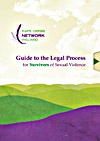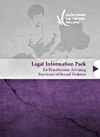Sexual harassment is behaviour of a sexual nature that is intended to frighten, intimidate and control you. Sexual harassment may involve only one incident or it may go on for some time.
Remember sexual harassment does not only occur in the workplace, it can happen in other places. Both women and men can be sexually harassed and harassers can be men or women. Harassers are not necessarily of the opposite sex – men can sexually harass other men and women can harass other women. There can be more than one harasser and more than one person affected by the incident.
SEXUAL HARASSMENT UNDERMINES YOUR CONFIDENCE, BELITTLES YOU IN FRONT OF YOUR PEERS AND COLLEAGUES, AND CASTS DOUBT IN YOUR MIND. STOP! TRUST YOUR FEELINGS. TAKE ACTION
The harasser often minimises sexual harassment, for example by pretending it was a joke.
What is Sexual Harassment?
Sexual harassment can take many forms:
- verbal abuse which is inappropriate, intimidating, humiliating, or degrading remarks of a sexual nature;
- abusive emails, pin-ups on a wall or something sent in the post;
- repeated unwelcome touch that feels invasive or uncomfortable to you;
- touch that is clearly sexual and offensive to you; and
- manipulating, pressuring or forcing you to have sexual contact in return for employment, promotion, or other rewards.
Effects of sexual harassment
As with any form of sexual violence or abuse, sexual harassment can have very serious effects:
- Sexual harassment in the workplace can affect your job and your career and the effects can last for years
- Sexual harassment can affect your mind, emotions and body. People who are being harassed may live in constant fear and this can cause symptoms of post-traumatic stress. More about trauma.
What you can do if you are being sexually harassed
If you are being sexually harassed and you feel frightened or confused by what is happening to you, believe and trust your own feelings. Do not dismiss it or hope it will ‘just go away’. It might not. Sometimes harassment starts out with ‘small’ acts and then builds up into actual sexual assault.
If you have any physical symptoms which you think are connected to the harassment, go to a doctor who will listen and take you seriously. Your local Rape Crisis Centre may be able to put you in touch with an experienced doctor.
Tell someone you trust about what is happening to you. If the first person does not take you seriously, talk to someone who will. You deserve to be believed and supported.
IT IS IMPORTANT TO BREAK THE ISOLATION SEXUAL HARASSMENT CAN CAUSE. TALK TO SOMEONE
Stopping the harassment
- Tell others about the harassment.
- Confront the harasser with the support of your work colleagues or someone you’ve confided in, and tell them to stop their behaviour.
- Decide whether to take further action if they do not stop.
REMEMBER THAT YOUR SAFETY AND WELLBEING IS YOUR FIRST PRIORITY
- Complain to your employer or the person in charge. Many organisations have a policy on professional misconduct and harassment, or an internal complaints procedure.
- Take a case through the Equality Authority, www.equality.ie, in the Republic of Ireland. In Northern Ireland, contact the Equality Commission, www.equalityni.org, for advice and help in how to bring a claim. Remember that in both the Republic and Northern Ireland there are strict time limits on bringing a claim.
- Talk to a solicitor about taking a civil case. Many Rape Crisis Centres will be able to put you in touch with a good local solicitor.
- Take a criminal case. To do this, you will have to report the harassment to the police (www.garda.ie or www.psni.police.uk). The PSNI has dedicated Rape Crime Units across Northern Ireland, staffed by teams of specially trained officers.
- Contact your local Rape Crisis Centre for support and more information. Find a RCC.
- If you are a trade union member, contact your union which will have policies on sexual harassment. (See www.siptu.ie or www.ictu.ie).
- If you feel your safety is in danger, leave your job or the place where the harassment is happening and report it to the police (www.garda.ie or www.psni.police.uk).

 Guide to the Legal Process for Survivors of Sexual Violence
Guide to the Legal Process for Survivors of Sexual Violence Legal Information Pack for Practitioners Advising Survivors of Sexual Violence
Legal Information Pack for Practitioners Advising Survivors of Sexual Violence